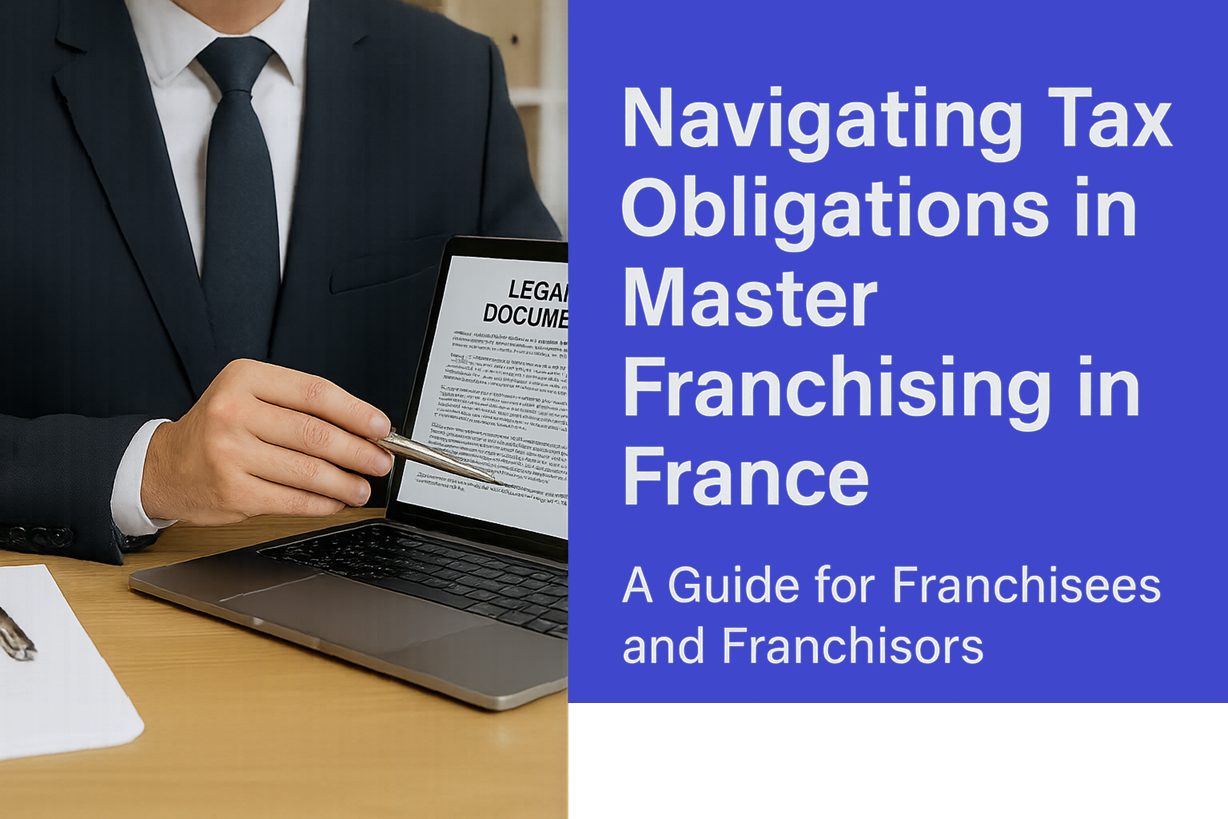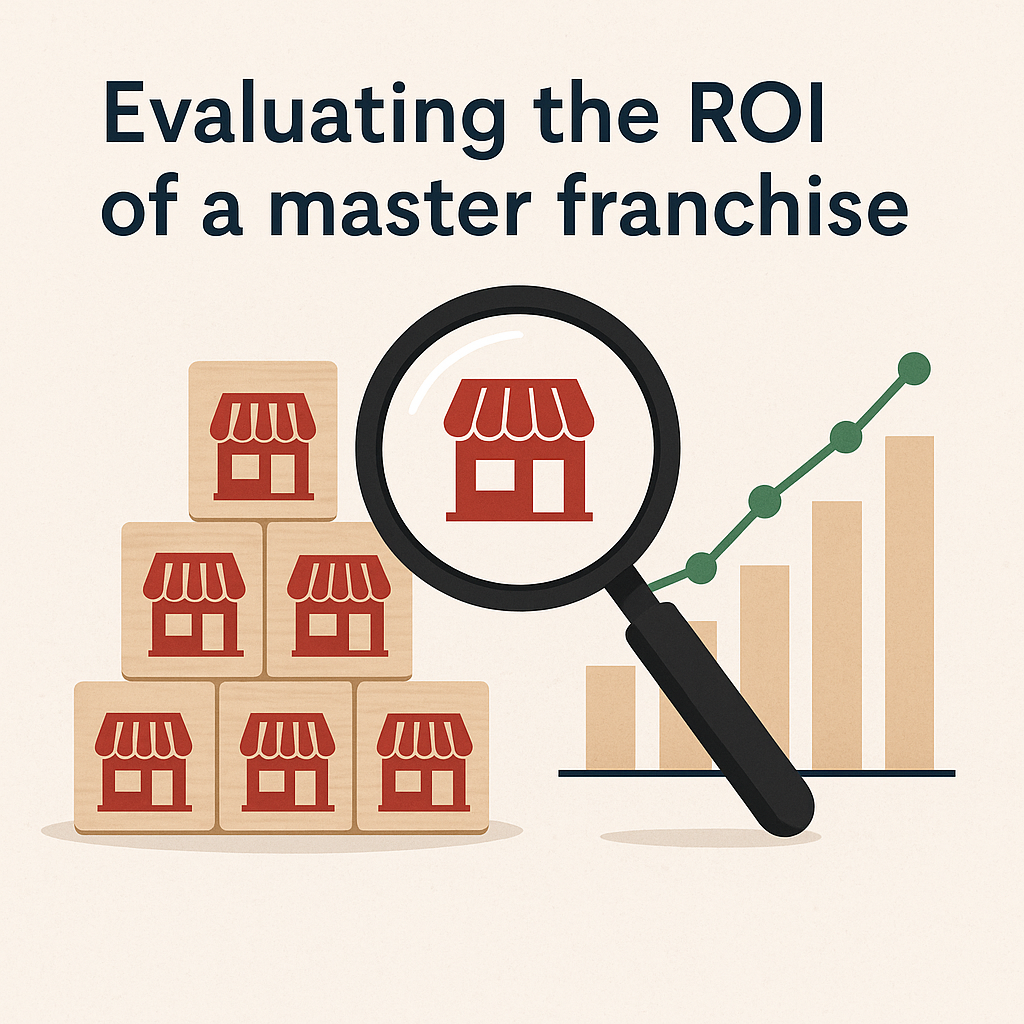Master franchising in France presents lucrative opportunities for international investors and franchisors, but it also comes with complex tax obligations.
Both the master franchisee and the franchisor must navigate France’s tax landscape – from corporate income tax to Value Added Tax (VAT) and withholding taxes on cross-border payments. This article provides a structured overview of the key tax implications of operating a master franchise in France (and in international contexts) and offers strategies to remain compliant. By understanding these obligations and planning accordingly, franchise stakeholders can avoid penalties, optimize their tax position, and ensure the venture’s profitability.
Master franchisees must diligently comply with French legal and tax requirements. The image illustrates a businessperson reviewing legal documents on a laptop, symbolizing the careful documentation and adherence to regulations needed for tax compliance in franchising.
Understanding the French tax landscape for franchises
French Corporate Tax and Income Tax: France does not impose any special tax regime on franchising – franchisors and franchisees are subject to the standard tax categories applicable to businesses. A company operating a master franchise in France will generally pay Impôt sur les Sociétés (IS), the French corporate income tax, on its profits. As of recent reforms, the standard corporate tax rate in France is 25% (down from higher rates in previous years). This means that the net profits earned by the master franchisee’s company in France will be taxed at around 25%. If the franchisor or master franchisee operates as an individual (which is less common for a master franchise due to scale), personal income tax rates apply – in France, individual tax rates are progressive up to 45%. In most cases, however, master franchisees set up a corporate entity in France to conduct operations, taking advantage of the corporate tax structure and limited liability.
Deductibility of Franchise Fees: From a tax perspective, the way franchise fees and royalties are treated is important for both parties. Typically, the initial master franchise fee (the upfront fee paid by the master franchisee to the franchisor for territorial rights) can be recorded by the franchisee as a business expense, and the ongoing royalty fees paid to the franchisor are treated as operating expenses as well. These payments reduce the taxable income of the franchisee’s French entity (since they are costs of doing business), thereby lowering its corporate tax burden. On the franchisor’s side, those same fees are recognized as revenue and are subject to corporate income tax in the franchisor’s home jurisdiction (for a French franchisor, at the standard French rate). In summary, franchise royalties and fees are deductible expenses for the paying franchisee and taxable income for the recipient franchisor. Both parties should document these transactions carefully in their accounts to substantiate the deductions and income.
VAT on Franchise Operations: France, like other EU countries, imposes a Value Added Tax (VAT) on most goods and services, and franchise fees are no exception. The current standard VAT rate in France is 20%, and franchise-related payments are generally subject to VAT. This means that when a master franchisee in France pays fees or royalties to a franchisor (especially if the franchisor is also based in France or has a French VAT registration), VAT is typically added to those payments. For example, if a master franchise agreement includes a €100,000 initial fee, an additional €20,000 in VAT may be payable on that transaction (unless an exemption or special scheme applies). The master franchisee can often recover this VAT if it is registered for VAT and using the franchise to make taxable supplies (such as selling products or services locally). In practice, VAT is neutral over the long run (as it is collected from end consumers), but compliance is critical – the master franchisee must charge VAT on any royalties or fees it collects from sub-franchisees in France and remit that to the tax authorities. Conversely, if the franchisor is invoicing the master franchisee from abroad, the transaction may require the master franchisee to self-account for French VAT under the reverse-charge mechanism. Ensuring proper VAT registration, invoicing, and filing is a key part of a master franchisee’s obligations.

Cross-border tax considerations in master franchising
Withholding Taxes on Royalty Payments: Master franchise arrangements are often international – for instance, a franchisor in one country grants master rights to an investor in France, who then pays royalties back to the foreign franchisor. In such cases, withholding tax (WHT) may be an issue. Under French domestic law, royalties paid by a French entity to a foreign entity are subject to a standard withholding tax (currently around 25% in line with the corporate tax rate, post-2022 reforms). This means that without any other arrangement, the French master franchisee would have to withhold 25% of each royalty payment and remit it to the French Treasury, sending only the net amount to the foreign franchisor. However, France has an extensive network of double taxation treaties which often significantly reduce or eliminate this withholding tax for franchise royalties. For example, if a U.S. franchisor earns royalties from a French franchisee, the France–US tax treaty may reduce the WHT rate (potentially to 0% in some cases) as long as certain conditions are met (such as the franchisor providing a tax residency certificate). It is crucial for the master franchisee and franchisor to structure royalty payments strategically and utilize applicable tax treaties to avoid double taxation. Typically, the franchisor will want to receive the full royalty without French withholding, which requires advance filing of treaty relief forms (e.g. the Cerfa 5000/5001 forms in France for treaty benefits). Both parties should consult tax advisors to ensure the proper withholding rate is applied; failing to do so can result in either overpayment of tax (hurting cash flow until a refund is obtained) or under-withholding (leading to potential penalties for the payer).
VAT and Cross-Border Services: Another international aspect relates to VAT on cross-border services. If the franchisor is not established in France and is providing franchise services (know-how, licenses, etc.) to a French master franchisee, typically the place of taxation for VAT purposes is France (where the franchisee is located, under EU “reverse charge” rules). In practice, the French master franchisee may need to self-assess VAT on payments to a foreign franchisor if the franchisor has not registered in France. Meanwhile, if the master franchisee in France provides services to sub-franchisees in other countries, similar VAT rules determine where VAT must be accounted. International franchising thus requires coordination of VAT obligations in multiple jurisdictions to ensure each government receives the tax it’s owed. Franchise agreements should clarify who is responsible for VAT and if prices are VAT-inclusive or not. A master franchisee may also need to educate its sub-franchisees on charging local VAT on their franchise fees and royalties within their territories.
Avoiding Permanent Establishments: A concern for foreign franchisors granting a master franchise in France is to avoid creating a permanent establishment (PE) for tax purposes in France. Normally, simply having a master franchisee (an independent company) in France will not by itself create a permanent establishment for the foreign franchisor. The master franchisee is operating its own business, not as an agent that binds the franchisor. However, if the franchisor becomes too involved in the French operations (for example, by directly operating units or having a dependent agent in France), the French authorities could claim the franchisor has a taxable presence. Care should be taken in structuring the relationship – usually, the franchisor will receive royalties and be taxed only in its home country (with the royalties possibly subject to WHT as discussed). Properly delineating the activities in the master franchise agreement (making clear the master franchisee is independent) and respecting corporate separateness will help maintain the intended tax separation between the two entities.
Key tax obligations and compliance strategies
Registration and Reporting: A master franchisee setting up in France will need to register with the French tax authorities for various taxes. This includes registering for corporate tax, VAT, and payroll taxes (if the franchisee will have employees to run operations or support the network). Once registered, the company must adhere to ongoing filing requirements: annual corporate income tax returns, periodic VAT returns (monthly or quarterly depending on revenue), and possibly withholding tax declarations if remitting royalties abroad. It is advisable to engage a French accountant or tax advisor early on to set up a compliance calendar and use the appropriate accounting standards. Notably, French accounting rules and tax filings will likely be in French, so having local expertise is invaluable.
Pre-Contractual Disclosure (DIP) – Tax Information: Under French franchise law, franchisors must provide a Document d’Information Précontractuelle (DIP) to prospective franchisees (including master franchisees) before any agreement is signed. While the DIP is primarily about business and legal disclosures, it often includes financial information such as anticipated investment costs and sometimes elements of financial performance. A master franchisee should scrutinize this information for any tax-related assumptions. For example, if the franchisor provides financial projections, confirm whether those figures are gross or net of French taxes, and whether costs like VAT, local business taxes (e.g. the CFE – Cotisation Foncière des Entreprises, a local business levy) are factored in. Ensuring clarity on tax assumptions in the business plan will help avoid unpleasant surprises later. It’s also wise for the master franchisee to request or model different scenarios (such as changes in tax rates or the impact of not obtaining a treaty WHT reduction) as part of their due diligence.
Hiring Tax Advisors and Accountants: Compliance with French tax obligations in a master franchise is not a one-time task but an ongoing process. French tax law can be intricate, and regulations may change (for instance, corporate tax rates were phased down in recent years, and VAT rules can be updated by EU directive). A prudent strategy is to retain a French tax professional or accounting firm experienced in franchising. As noted by experts, working with advisors specializing in French tax law is advisable to remain fully compliant and to optimize the tax structure. These experts can assist with initial structuring (e.g. whether to set up just one French company or a group of companies for different franchise functions), ongoing compliance (filings, VAT claims, documentation of intercompany fees), and audits if they arise. The cost of professional advice is often far less than the potential penalties or inefficiencies that can result from mismanaging taxes.
Tax Efficient Structuring: There are a few strategies a master franchisee and franchisor might employ to manage tax obligations efficiently while remaining within the law. One strategy is choosing the right business entity for the master franchisee. In France, common structures include the SAS (société par actions simplifiée) or SARL (société à responsabilité limitée). These are taxed as corporations by default, which is usually beneficial for reinvesting earnings (tax is at 25%, and profits can be retained in the company for expansion). In some cases, a master franchisee might qualify for a small business reduced corporate tax rate (France has a 15% rate on a portion of profits for very small companies), though many master franchises will exceed the thresholds for that. Another consideration is how to finance the master franchise: interest on loans, for example, is generally tax-deductible, which can reduce taxable profit (though France has limitations on interest deduction if the debt is excessive – thin capitalization rules). If a franchisor provides financing or if the master franchisee gets funds from related parties, it’s important to set interest rates at arm’s length to satisfy transfer pricing rules.
Handling of Royalty Payments: To minimize issues with royalty taxation, some master franchise structures involve alternative payment arrangements. For instance, a portion of what the master franchisee owes to the franchisor could be labeled as a management or consulting fee rather than a royalty, if there are substantive services provided by the franchisor. Sometimes, management fees might not attract the same withholding tax treatment as pure royalties (depending on tax treaty definitions). However, it’s critical not to engage in artificial reclassification solely to avoid tax – French tax authorities (and others) can recharacterize payments based on economic substance. Any management fee or service fee should correspond to real services (training, support, etc.) that the franchisor provides. A benefit of legitimate service fees is that they may qualify for treaty provisions that eliminate withholding (as business profits under certain treaties), but it requires careful legal drafting and tax advice. Ultimately, compliance and transparency are key; whatever the structure, all payments to a foreign franchisor must be declared properly, and any applicable treaty relief should be applied for in advance.
Ensuring compliance and avoiding pitfalls
Local Taxes and Social Charges: Apart from the headline taxes (corporate tax and VAT), a master franchisee in France should be mindful of other taxes. For example, employer social contributions in France are high – if the master franchise entity hires staff (for training new franchisees, marketing support, etc.), the salary costs will include significant payroll taxes. These labor-related taxes aren’t “franchise-specific” but will affect the overall cost structure and should be budgeted. Another consideration is local business taxes, like the aforementioned CFE and CVAE (Cotisation sur la Valeur Ajoutée des Entreprises, applicable for larger businesses). These are annual taxes that depend on business size and added value and will kick in as the franchise network in France grows in revenue. While not as substantial as corporate income tax, they still must be paid and filed annually. Staying ahead of these obligations by consulting with a French expert or using tax software ensures that nothing is overlooked.
Penalties for Non-Compliance: France enforces its tax laws strictly. Failure to comply with tax obligations can lead to penalties, interest charges, or even legal disputes that can harm the franchise’s reputation and finances. For instance, if a master franchisee does not charge VAT to sub-franchisees when it should, it could later be required to pay that VAT out of pocket, plus late penalties. Similarly, not withholding tax on cross-border royalties when required can result in the French tax authority holding the French payer liable for the tax, again with surcharges. In extreme cases, significant tax underpayment could jeopardize the master franchisee’s business operations (through liens or enforced collections) and strain the franchisor-franchisee relationship. Thus, the cost of compliance is an essential investment. French tax audits typically can review several years of past returns, so a mistake can accumulate exposure over time. The best defense is proactive compliance – accurate record-keeping, on-time filings, and seeking clarification from tax authorities when in doubt.
Compliance Strategies and Best Practices: To effectively manage these responsibilities, master franchisees should implement internal controls and schedule periodic tax reviews. It may be wise to conduct an annual tax review with professional advisors, essentially an “audit prep,” to identify any positions that might be questioned. Additionally, maintain thorough documentation: contracts, invoices, proof of payments, and evidence for any tax deductions (for example, if claiming a deduction for franchise fees, retain the franchise agreement and proof of payment; for VAT credits, keep vendor invoices, etc.). France requires that accounting records be kept and made available in French generally, so even if the franchise’s internal working language is English, official books may need to be translated or annotated for an audit.
Finally, staying informed about changes is part of compliance. Tax laws can change with each Finance Act. For example, if the French government alters the VAT rate or if a new tax treaty is signed affecting royalty taxation, the master franchisee should be ready to adapt contracts and pricing. Subscribing to updates from reputable law or accounting firms in France or joining a franchise association (like the French Franchise Federation, FFF) can help keep one’s finger on the pulse of regulatory changes. In summary, knowledge and preparation are the master franchisee’s allies in navigating tax obligations. By building a robust tax compliance framework, both franchisees and franchisors can focus on growth, knowing that their legal obligations are well managed – a foundation for sustainable success in the French market.
Conclusion
Navigating the tax obligations of a master franchise in France requires a combination of local knowledge and diligent planning. From corporate taxes at roughly 25% to VAT on franchise fees and the nuances of withholding taxes on cross-border royalties, both franchisors and master franchisees must approach compliance proactively. The French system, while complex, offers clarity when one seeks the right advice: franchise fees and royalties are generally taxable like any other business income and expense, VAT applies but can be reclaimed, and tax treaties exist to prevent double taxation. The key is to integrate tax strategy into the overall franchise plan – ideally before the master franchise agreement is signed – and to maintain strict compliance thereafter. By doing so, master franchisees can avoid costly pitfalls and focus on what really matters: developing a thriving franchise network. In a country known for its robust legal framework, a master franchisee who stays on top of tax and legal obligations will find France to be a rewarding environment for franchising success. With the right preparation, meeting French tax obligations becomes a manageable aspect of your expansion strategy, rather than an obstacle, thereby paving the way for smooth and profitable operations in the long term.



